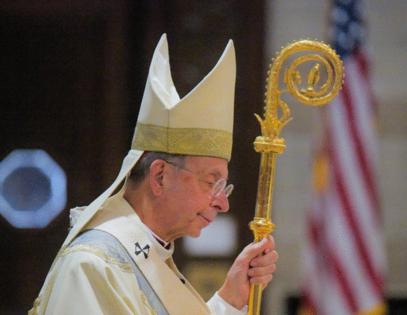Baltimore archdiocese, abuse survivors still far apart on settlement in bankruptcy case
Published in News & Features
BALTIMORE — As the Archdiocese of Baltimore’s bankruptcy case enters its third year, there is still a gap worth hundreds of millions of dollars in court between the nation’s first diocese and the survivors of rampant sexual abuse throughout its parishes and schools.
That difference and a seeming lack of progress toward resolution, a judge said Monday, could return the financial claims filed against the Catholic Church to the state courts, where they have been paused for months.
“If we’re not going to be quick here, why do we need to stay here?” asked U.S. Bankruptcy Judge Michelle Harner.
On Friday, church officials told the court they would be willing to direct $33 million of its own money toward a settlement with survivors, an amount attorneys for the survivors said would result in about $35,000 per claimant.
That figure was unacceptable, survivors’ attorney Andrew Glasnovich said, describing the church’s bankruptcy claim as an “absurd and unsupported” attempt “to delay justice for survivors.”
The average settlement proposed Friday would also be nearly half the average amount paid to victims by the archdiocese in settlements — $65,000 — before Maryland passed the Child Victims Act in 2023, a landmark bill that eliminated the statute of limitations for launching sex abuse lawsuits.
In response to the church’s plan of reorganization, the Official Committee of Unsecured Creditors, which represents more than 900 victims, has asked for a nearly $890 million resolution.
They have also asked Harner to dismiss the case from federal bankruptcy court. Glasnovich said that decision could provide survivors with more avenues of recourse, including the opportunity to lobby for changes to the Child Victims Act, which was amended this year to reduce the amount of possible damages.
Those new caps led to a mad dash in courthouses across the state, with more than 3,800 claims filed against public and private institutions in a roughly two-month period, according to an analysis of court records by The Baltimore Sun. Of those cases, approximately 298 more accusers started suits against Baltimore’s archdiocese, The Sun found.
On Friday and in court on Monday, church officials said they are continuing to work toward a fair and equitable compensation plan for survivors, one that would take place faster and include all claimants.
“As the court process continues, with every day that passes, the suffering of victim-survivors is prolonged, which is why we must continue to act with urgency until the settlement is reached so that victim-survivors can receive compensation as soon as possible,” Baltimore Archbishop William Lori said in a statement Friday.
Filed in late September 2023, days before the Child Victims Act took effect, the church’s bankruptcy case has been scrutinized by survivors in and out of the courtroom.
Several, in public and in letters to Harner, have accused the church of stalling payouts and stuffing the matter into the “secrecy” of the bankruptcy process. Multiple attorneys and the judge on Monday referenced ongoing mediations, for instance, but were barred from providing details.
Referencing a fees and expense report from the archdiocese, which includes millions of dollars to both their own and the victims’ attorneys, one survivor wrote in July that lawyers are getting paid, “Yet the victims have nothing to show for this money being made amongst these firms. I call this atrocious.”
That frustration was also exacerbated in May when the Catholic Church claimed “charitable immunity” in bankruptcy court — a doctrine meant to ensure donations go toward a charity’s mission, not “pay the organization’s civil damage awards,” according to the Thurgood Marshall State Law Library.
Referencing public statements made by Lori, committee attorney Edwin Caldie argued that compensating survivors for their pain has become a part of the church’s mission and that immunity should not be applied.
“The impact of confidential immunity is just too absolute,” he said.
Attorneys for the church said they brought the case to bankruptcy court to streamline the resolution process, as opposed to litigating the hundreds of individual cases halted in the state judiciary. Attorneys for the committee, meanwhile, said the settlement is not about the money itself but “what the money represents: an authentic process that is finally fair to the people who waited decades for fairness.”
Despite the monetary difference between the settlement proposals, lawyers for both parties, as well as the parishes and insurance providers involved, each said Monday that they believe a resolution is still possible.
In a statement after the immunity claim was submitted, church spokesperson Christian Kendzierski said the archdiocese was “surprised” by the deadlock it had created, given their “longtime practice of pastoral care and history of settlements with victim survivors.”
Kendzierski declined to comment Monday.
Harner, the bankruptcy judge, said she will not issue rulings on any motions or arguments made Monday, but that she will not become another source of delay in the case. Harner asked representatives from both the Archdiocese of Baltimore and the survivors to submit any additional information they wanted her to review by Oct. 13, hoping to reach a resolution sooner rather than later.
“Regardless of what I do, whether it’s now or after trial, there are going to be appeals and litigation and the only parties — let’s be honest — that benefit from that are the lawyers in this room,” Harner said. “I would much rather see all of that money go into the pot.”
_____
(Reporter Chevall Price contributed to this article.)
_____
©2025 Baltimore Sun. Visit baltimoresun.com. Distributed by Tribune Content Agency, LLC.







Comments